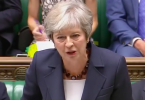“How Scottish are you?” It’s an important question and relates to the issue of Scottish branding on food that I wrote about last week. Post Brexit we have seen a significant increase of the Union Jack flag (yes I know that’s not it’s official name) on food products in particular. Often this union branding is on Scottish produce, when all the research demonstrates that Scottish branding would add value to the product in question. Some people have called this Union-Jackery and you can see it in entertainment as well The number of shows with British has risen and dramas focused on Royalty and historical British figures are also a trend.
This is a natural reaction, having voted to leave the EU a resurgent British nationalism is coming to the fore and it will naturally seep into all aspects of society. Natural but not positive, because British nationalism is rooted in an out of date, isolationist and often xenophobic air of superiority which, as I have pointed out before, is the polar opposite of the civic, inclusive welcoming and internationally focused movement for Scottish home rule.
So are people’s perceptions of being Scottish or British changing, and what does it mean politically? The best source of how to measure the impact of feeling Scottish on independence support comes from Moreno via ScotCEN’s Scottish Social Attitudes 2016 research.
The survey of over 1,000 Scottish residents asked people to categorise their nationality in one of the following ways and it can helpfully breakdown the change in support for independence in each category and it’s a little surprising:
- 24 per cent consider themselves ‘Scottish not British’ and between 2012 and 2016 their support for independence rose by 23 per cent.
- 28 per cent saw themselves as ‘More Scottish than British’ and independence support surged 33% in that group over the same period.
- 29 per cent claimed to be ‘Equally Scottish and British’ and 15% more of them switched to supporting independence.
- And somewhat surprisingly, support for independence even rose by 6 per cent in the groups which felt ‘More British than Scottish’ or ‘British not Scottish’.
That is a double category because in ScotCens own words those last two groups were so small they had to be combined to be statistically relevant, and it’s also the only category with a statistically relevant change in self-categorisation with 11 per cent identifying as British dropping to 8 per cent.
So how is this useful to campaigners? Well, the next time you get into a conversation in real life or online about independence with a No voter, maybe just out of interest, ask them how they would categorise their nationality?
If you find a No voter in groups 1, 2 or 3 you have a higher chance of conversion and given that still only 23 per cent of group 3 (Scottish and British) support independence they are the ones that will decide the next referendum. Also as they are comfortable with dual nationality identities, it’s entirely possible they also relate strongly to being European and that gives us the frame to work with. They are not leaving Britain, Britain is leaving them – just as it left me.
Further reading: Scottish branding and buying local boosts Scottish jobs








The exploitation of British Nationalist symbolism is growing fast, especially on advertising – the lowest and most blatant form of propaganda and conditioning.
It might have escaped many – but not me – that the New Mini advert focuses multiple times on the rear lights cluster of the car where – surprise, surprise – the design is that of a half Union Jack. Borderline trolling, if you ask me, given that the Mini brand is owned by the Germans – BMW.
Again, the “Vauxhall” brand of cars (sold as “Opel” in EU and US and the disgraced “Holden” in ‘stralia) using the tagline “British brand since 1903” is owned by the French – PSA.
I’m in two minds: can’t decide if this is supreme trolling by Europe, or it’s another strand of the Cambride Analytica psyop, riding on pure and unadulterated jingoism, prodromic to fascism.
Dangerous times to live in.